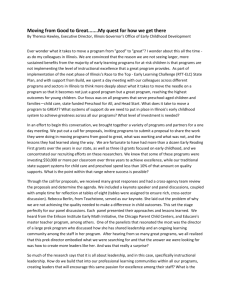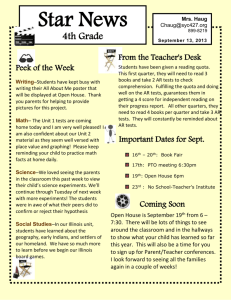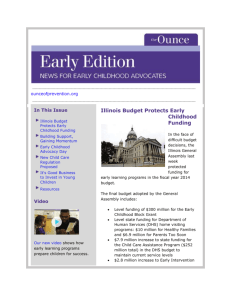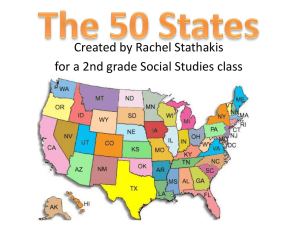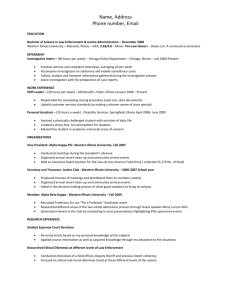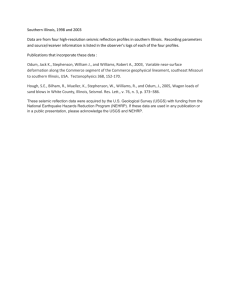Fall 2010 - Ounce of Prevention Fund
advertisement
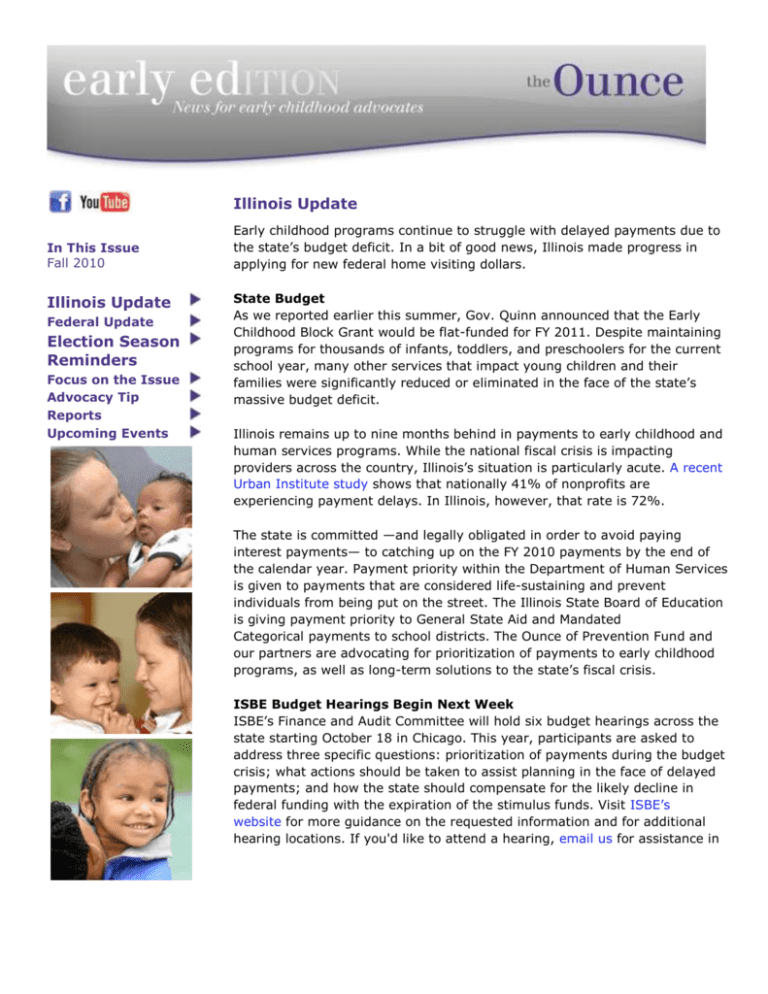
Illinois Update In This Issue Fall 2010 Illinois Update Federal Update Election Season Reminders Focus on the Issue Advocacy Tip Reports Upcoming Events Early childhood programs continue to struggle with delayed payments due to the state’s budget deficit. In a bit of good news, Illinois made progress in applying for new federal home visiting dollars. State Budget As we reported earlier this summer, Gov. Quinn announced that the Early Childhood Block Grant would be flat-funded for FY 2011. Despite maintaining programs for thousands of infants, toddlers, and preschoolers for the current school year, many other services that impact young children and their families were significantly reduced or eliminated in the face of the state’s massive budget deficit. Illinois remains up to nine months behind in payments to early childhood and human services programs. While the national fiscal crisis is impacting providers across the country, Illinois’s situation is particularly acute. A recent Urban Institute study shows that nationally 41% of nonprofits are experiencing payment delays. In Illinois, however, that rate is 72%. The state is committed —and legally obligated in order to avoid paying interest payments— to catching up on the FY 2010 payments by the end of the calendar year. Payment priority within the Department of Human Services is given to payments that are considered life-sustaining and prevent individuals from being put on the street. The Illinois State Board of Education is giving payment priority to General State Aid and Mandated Categorical payments to school districts. The Ounce of Prevention Fund and our partners are advocating for prioritization of payments to early childhood programs, as well as long-term solutions to the state’s fiscal crisis. ISBE Budget Hearings Begin Next Week ISBE’s Finance and Audit Committee will hold six budget hearings across the state starting October 18 in Chicago. This year, participants are asked to address three specific questions: prioritization of payments during the budget crisis; what actions should be taken to assist planning in the face of delayed payments; and how the state should compensate for the likely decline in federal funding with the expiration of the stimulus funds. Visit ISBE’s website for more guidance on the requested information and for additional hearing locations. If you'd like to attend a hearing, email us for assistance in developing talking points. Federal Home Visiting Dollars Illinois submitted its application for the federal home visiting funding appropriated in the health insurance reform law. The Home Visiting Task Force, a committee of the Early Learning Council charged with coordinating the state’s application, designed an initial state plan and managed the required needs assessment submitted this fall. Federal funding will be directed by the governor’s new Office of Early Childhood Development and the Home Visiting Task Force, and is expected to be approximately $1.25 million for programs for the first fiscal year. The task force awaits final guidance from the federal government before submitting the updated plan describing how home visiting coordination will improve the state’s health and school's outcomes for children and families. Other Illinois Updates Shannon Christian joined the governor’s Office of Early Childhood Development as its director on September 13. Christian previously served as Associate Commissioner in the U.S. Department of Health and Human Services Administration on Children and Families, where she was responsible for the Child Care Bureau. This new management marks a clear commitment from the executive level to maintain Illinois’s place as a national leader in early childhood systems. Christian will be coordinating efforts to move our state forward in establishing a high-quality, accessible, and comprehensive early learning system, along with implementing recommendations put forth by the Early Learning Council. Advance Illinois recently released its report card on education in Illinois. While the report applauded Illinois as a national leader in early childhood education, citing the high level of access to programs taught by effective teachers, Illinois received an incomplete grade for early childhood. The report stated Illinois “would have earned a B+ for its efforts,” if not for the lack of aggregated data on school readiness and on how well at-risk populations are being served by publicly funded programs. Indicating that “Illinois has much work to do,” the report gives Illinois’s K-12 system a “D,” stating that progress in academic achievement and closing the achievement gap have stagnated. Advance Illinois’s appraisal gave the state’s post-secondary education a “C,” with the observation that the state’s college affordability and the college and career readiness of its students are critical factors in the low post-secondary attainment rates. Federal Update Congress still has yet to approve a budget with funding for critical early childhood programs, while the Department of Health and Human Services has made changes to improve the quality of Head Start programs for low-income children. Federal Budget On September 29, Congress adjourned and members headed home to prepare for the upcoming elections. Failing to meet the annual October 1 budget deadline, Congress instead passed a continuing resolution that allows programs to be funded at current levels until December 3. This allows Congress time to return to Washington after the election to continue their work on the FY 2011 appropriations bills. Last year Head Start, Early Head Start, and the Child Care and Development Block Grant received temporary increases through the American Recovery and Reinvestment Act. President Obama’s proposed budget, released in February, maintained funding at the increased levels, and both the Senate and House made steps towards maintaining most or all of these increases in their initial appropriations work. A House Appropriations Subcommittee maintained the majority of funding proposed by the president, and the Senate Appropriations Committee passed a suggested budget that further increases funding for these important early childhood programs. In addition, the Senate Appropriations Committee included funding for the Early Learning Challenge Fund, which would provide competitive grants to states to coordinate quality improvement efforts across disparate early learning systems and programs. While these each mark important steps in appropriations for early childhood programs, the work is not finished. There are significant concerns about the overall budget, and we will continue to fight for this funding when Congress comes back to work. HHS Announces Changes The US Department of Health and Human Services (HHS) announced a plan to make Head Start grants more competitive. While current Head Start regulations generally only revoke grants from programs with serious problems, the new plan intends to rate programs based on quality and require the bottom 25% of programs to re-compete with new program applications each year. The proposed rules will automatically require programs to compete if any of seven criteria are found, including a “serious deficiency” in basic program facets and concern over a program’s financial viability. These proposed rules are currently open for public comment and will be solidified in the upcoming months. On October 4, the Administration for Children and Families in HHS announced a reorganization that promotes the Child Care Bureau to the Office of Child Care. This office will administer the federal child care assistance program, increase collaboration with the Head Start Office and other key agencies, and elevate child care issues within the department. Jobs Funding in Jeopardy Congress did not vote to extend the TANF Emergency Contingency Fund before adjourning, ending federal funding aimed at providing jobs to lowincome workers across the country. In Illinois, this funding was used to subsidize the Put Illinois To Work initiative, credited with providing more than 26,000 jobs around the state. Gov. Quinn did announce a two-month extension to the job program to serve as a bridge and in the hopes that Congress will vote on funding the program after the November elections. Election Season Reminders The November 2 election is around the corner, and many early childhood issues and statewide elected positions are at stake. If you forgot to register or change your address, you can take advantage of Illinois’s registration grace period, which allows individuals to register until October 26. Registrants are required to bring two forms of identification and vote at the time of registration at their local election office (choose your home county to find the location of your local offices). Save time on Election Day by voting at your convenience. Early voting is happening now! From October 12-28, you can cast your vote at locations throughout your community. Check with your local election office for the hours of your early voting locations. And, new this year, you no longer have to have a reason to vote absentee. Request an absentee ballot from your local election official and remember to have it postmarked by November 1. Focus on the Issue - Ensuring Preschoolers Get Special Education Services Are preschool children receiving the special education evaluations and services to which they are entitled? Recent legal actions have been taken in Illinois and Washington, DC, to ensure that young children get critical services that could prevent further delays and, in some cases, eliminate the need for intervention in later school years. Under the Individuals with Disabilities Education Act (IDEA), school districts are required to ensure that all preschool children are located, identified, evaluated, and provided special education services within mandated timeframes. Unfortunately for some young children, this doesn’t always happen. This summer, a class state complaint was filed in Illinois alleging that Chicago Public Schools (CPS) failed to evaluate and provide special education to preschool children in Head Start programs. In response to the complaint, CPS acknowledged that referrals for approximately 1,000 early childhood students were initiated, but not completed, during the 2009-2010 school year. In August, the Illinois State Board of Education issued findings and corrective action against CPS, requiring the school district to submit a plan to eliminate the backlog of evaluations and complete evaluations for all preschoolers initiated this school year. CPS is initiating new procedures for handling preschool evaluations that include centralized scheduling and monitoring. In August, in DL et. al. vs. the District of Columbia, a Federal District Court judge ruled that the District of Columbia Public Schools denied hundreds of disabled preschool children special education evaluations and critically needed services in violation of the IDEA. According to the decision, as of 2007, the District of Columbia served a lower percentage of its 3-to-5-year-old population with special education services than any state in the country. Currently, the parties are meeting to discuss possible settlement of the remaining issues and what procedures are necessary to bring the school district in compliance with IDEA. If no resolution is reached, the parties will return to court in April 2011 to determine if the court needs to provide further intervention and oversight. These cases shine a light on the current challenges our youngest children and their families face to gain access to the special education services they are entitled to under federal and state law. The Ounce and its advocacy partners will continue to monitor these cases and work toward policies that will guarantee all children receive these services in a timely manner. Advocacy Tip for the Season Let candidates and newly elected officials know what’s really important to you! The election season gives early childhood advocates a great opportunity to teach decision-makers about early childhood issues in their communities. While candidates are asking for your vote, talk to them about the critical need for early childhood funding and services throughout Illinois. Attend candidate forums, events, and debates to educate them on the issues. Take a copy of our early childhood talking points to help communicate effectively with the candidates. After the election, take a moment to introduce yourself—and the early childhood services in your community—to newly elected officials before they head off to Springfield and Washington, DC. Become a resource for them on early childhood issues by inviting them to a local program or by scheduling a meeting in their office before they vote on funding and legislation that will impact services for young children. Need help planning a site visit or legislator meeting? Email us at advocacy@ounceofprevention.org. Reports 2010 Report on Illinois Poverty This Heartland Alliance report details how years of disinvestment in Illinois’s safety net, combined with the effects of the recession and an antiquated state revenue system, resulted in an erosion of human services across the state. Home Visiting Services for Young Latino Families Produced by the King County Children and Family Commission, this report details the unique needs of young Latino parents and the challenges they face when accessing resources. The report discusses benefits of home visiting programs to young Latino families and suggests ways that programs can improve to meet the needs of this population. Upcoming Events La Presencia Latina: Staying Strong, Moving Forward, Defining our Future November 19 Save the date for the 8th Annual Illinois Legislative Latino Caucus Foundation Conference, which will address the major public policy issues important to the Latino community, including education, immigration, health and human services, and the economy. Illinois Obesity Action Summit December 3 The Illinois Alliance to Prevent Obesity will convene stakeholders to prioritize policy and environmental strategies aimed at reducing obesity. The summit is a culmination of discussions held across the state this fall through more than ten regional forums. Tax Credits and Tax Credit Outreach Webinars October 21 and November 10 National Women’s Law Center will host this series of webinars designed to teach advocates about the basics of tax credits for lowincome families. NWLC will also discuss how to connect families with free resources in your community and other valuable information for those working with families in need.

